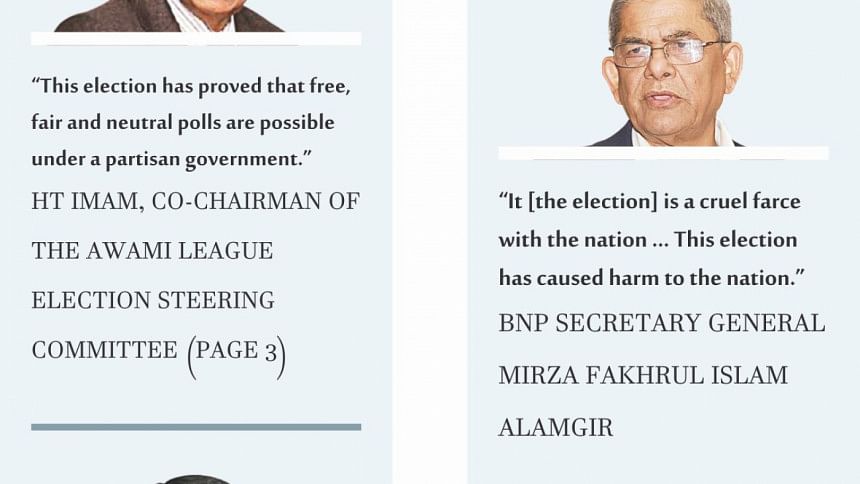
What they said
Related News
BNP Chairperson Khaleda Zia yesterday said she would not say anything about Sunday's national election.
She said this when reporters asked her about the election after a hearing of the Niko graft case at a makeshift court inside the Old Dhaka Central Jail.
As she was being taken back to her cell in a wheelchair, she said, “My legs ache too much.”
During the hearing, she told the court, “I won't come to the court if it sits at a place like this. The court can't run here. Our people can't come here. Give me sentence if you want….I won't come to this court.”
Judge Sheikh Hafizur Rahman of the Special Judge Court-9 of Dhaka said, “Start the charge hearing afresh as I am new in this case. I will hear everyone's speech.”
After that, Public Prosecutor of the Anti-Corruption Commission Mosharraf Hossain Kajol read out the charges against Khaleda and 10 others.
BNP standing committee member Barrister Moudud Ahmed, an accused in the case, told the court, “We are yet to get the documents stating the allegations against us although we have applied for them before. We need to read those documents to be able to fight the legal battle.”
He also said the setting of the court was not appropriate for holding a trial as there was no proper seating arrangement for lawyer and others.
Prosecutor Mosharraf Hossain Kajol argued that the defense was trying to delay the charge framing by saying those things.
The court fixed January 13 for the next hearing.
The judge also kept a petition in the case file submitted by Attorney General Mahbubey Alam on November 22 last year seeking permission to produce an FBI agent and two Canadian police as witnesses before the court to testify.
On December 9, 2007, the ACC filed the case with Tejgaon Police Station accusing Khaleda and 10 others of abusing power to award a gas exploration and extraction deal to Canadian company Niko.
The Election Commission (EC) today sent a letter to the parliament secretary for taking necessary preparation to organise the oath-taking ceremony of the newly elected lawmakers of the 11th general election.
EC Secretary Helaluddin Ahmed said this while talking to reporters at the EC office today.
The MP-elect will take oath at the oathroom of the parliament at 11:00am tomorrow, sources at the Parliament Secretariat confirmed.
Yesterday, the commission published the gazette with details of 298 MPs with the EC’s approval.
According to the article 148 (2A) of the Constitution, the newly elected members of parliament will be obliged to take oath within three days after the publication of election results through official gazette, or else their memberships will cease to exit.
The new cabinet may take oath on Sunday.
In the December 30 parliamentary election, the AL-led Grand Alliance won 288 seats in the Jatiya Sangsad against the BNP-led Oikyafront's seven.
Three independent candidates also became victorious.
The election in Brahmanbaria-2 was suspended as voting at three polling centres was suspended over violence. Polling in those centres will be held on January 9.
Polls in Gaibanda-3 were rescheduled for January 27 following the death of a candidate.
Prime Minister Sheikh Hasina's ICT Affairs Adviser and son Sajeeb Wazed Joy today explained why the Awami League secured absolute majority and its rival BNP experienced a debacle in the 11th parliamentary elections.
In a status published in his verified Facebook post, Sajeeb Wazed Joy has given his analysis of the polls results.
Here is the full text of the status:
The BNP and Okyo Front, having been thoroughly rejected by our voters, have taken to begging their foreign masters for help. They are on an international lobbying and PR blitz to try to prove that our elections were rigged. The fact is that it is mathematically impossible. The Awami League's margin over the BNP is about 49 million votes. It is simply not possible to manipulate elections by 49 million votes without it being caught on everyone’s mobile camera. As for their claims of voter intimidation, even if every voter who did not vote for AL voted for the Okyo Front, they would still be more than 22 million votes short.
Still, a section of our so called "civil society" continues to join the BNP’s international PR campaign against our election. I would like to address all their complaints and raise a few of my own.
The first complaint is that voter turnout was too high and indicates false votes. The final voter turnout figure is 80% and it is not a record in Bangladesh. That distinction is held by the 2008 elections under the 2007-2008 "caretaker" regime when turnout was 87%. The AL won that election in a landslide with 48% of the vote by itself. In 2001 the voter turnout was around 75.6% and in 1996 it was 75%. Turnout was just slightly higher because this is the first fully participatory elections in a decade.
The second propaganda is that the ruling party received 90% of the vote. This is a complete falsehood. The AL by itself received around 72%. Our Mohajote allies received just under 5%. Even the 72% is not a record for the AL. In the 1973 election after Independence the AL received 73.2% of the vote. Just as the reason then was the AL led the country to Independence, our vote increase this time has two very good reasons.
The first reason is simply because our AL Government has improved the lives of our citizens more than any other government in Bangladesh’s history. We have become a middle income country, per capita income has trebled, poverty has been halved, almost everyone has access to education, basic healthcare, electricity, and the list is endless. If there was a way to improve the lives of the Bangladeshi people, our Government has done it or the progress is visible.
Our “civil society” keeps harping about how the Bangladeshi voters are anti-incumbent, but that is just an indication of how out of touch they are with the common man. If you are an ordinary citizen, even if you are a wealthy businessman, your life and business are doing so much better now since the AL has turned Bangladesh into the fastest growing economy in the world. Why would you vote against the government that has transformed your life and business?
The second reason is that our election campaign did not start last year. It started right after the 2014 elections. We have not wasted any opportunity to inform the Bangladeshi people that we, the Awami League, are solely responsible for the positive changes in their lives. All the social and economic successes that have happened were because of the vision, planning, execution and hard work of our AL Ministers, Members of Parliament, Councilors, everyone. While our opposition and “civil society” were busy complaining about problems, we were telling people how we were providing solutions.
One of the favorite refrains of our “civil society” was that we have the largest number of new voters in this election; they don’t care about political parties and would be anti-incumbent. What they did not consider was that these young men and women grew up with the visible development work of our AL Government making their lives better and easier every year. Why would they vote for anyone else?
I have been conducting opinion polls for the Awami League since 2013. If you will notice, there was a dearth of opinion polls from our “civil society” this year. Prior to the 2014 elections they were busy publicizing one poll after another how badly the Awami League was going to lose. The fact is very few people and organizations in Bangladesh know how to conduct an accurate opinion poll. I have studied polling at Harvard and have interviewed and tried several polling teams in Bangladesh before I found the one we use. We don’t do artificial polls to inflate our popularity because that does not give us the information we need. We poll to know what our popularity is for elections and so our polls need to be accurate.
Our final opinion poll two weeks before the elections showed that the AL would receive between 57%-63% of the vote and the BNP would receive between 19%-25%. So how did the AL receive 72% of the vote? Our opinion poll sampled the entire voters list in 300 constituencies, all 104 million voters. But there is never 100% voter turnout and elections were held in 298 seats, not 300. The number of registered voters in the 298 seats was 103.5 million and an 80% turnout means 82.8 million people voted. The AL received about 60 million votes. 60 million out of 103.5 million is 58% of registered voters in those seats. The AL actually received votes on the low side of our poll’s margin of error.
So why did the Okyo Front receive so few votes? There are some very logical reasons. The BNP’s Chairperson has been convicted and is in jail. Their Acting Chairperson is a fugitive who is not even in Bangladesh. Their organization is in complete disarray. But those are not the most significant factors. There is one factor our “civil society” doesn’t want to acknowledge as it makes the BNP look really, really bad!
I’ve observed its effect through annual opinion polls. Once the BNP started burning civilians alive during their 2013-15 arson attack campaign, their popularity fell off a cliff. Prior to the arson attacks the BNP was usually around 10% behind the AL in opinion polls. After the arson attacks they fell 30% behind and kept falling.
Then there was their self-defeating election campaign, or rather a lack of it. The first thing they did was bring out Tariq Rahman to pick election nominees. All this managed to do is remind people of Hawa Bhaban and his corruption and violence. To add fuel to the fire, he picked known and wanted criminals and war criminals as candidates! Do you think their popularity would increase or decrease after this?
Next, the message they kept sending out to their supporters until the last minute was that they would boycott the elections. If you think your party is going to boycott, are you going to go out to vote? This is what caused the drop in their voter turnout and hence, their low percentage of the vote.
Finally, the only message the BNP and Okyo Front had for the people of Bangladesh is that the AL is bad. Given that the people could see the visible improvements in their lives over the past decade of the AL Government this was an extremely tough sell.
The Oikyo Front’s figurehead Kamal Hossain did not even run in this election. Why is that? It is because he knew he had absolutely no chance of winning a seat for himself. Of course, they surprised us. For the very first time in their existence as a political non-entity, his Gono Forum has actually won not one, but two seats! If there was any rigging in these elections, how could an opposition party that has never won a single seat win two?
The truth is far simpler. If you’re a citizen and especially a youth who sees a dynamic leader such as Sheikh Hasina developing and transforming the country, it won’t matter how much mud the opposition slings. At the end of the day you are going to vote for the party that is improving your life and the country.
In the first parliament 45 years ago, none of the parties was recognised as official opposition due to their poor strength in the House.
The resounding victory of ruling Awami League-led alliance in Sunday's polls has diminished the scope for emergence of an official opposition in the new parliament.
The AL-led alliance together grabbed 288 seats out of 298 with the ruling party alone bagging 259 seats. The BNP-led alliance managed to secure only seven seats. [Election to Gaibandha-3 was rescheduled to January 27 following the death of a candidate and re-polling will take place in three centres in Brahmanbaria-2 on January 9.]
Against this backdrop, Jatiya Party may sit on the opposition bench in the new parliament to be formed with MPs-elect swearing in tomorrow.
The JP, a key component of the AL-led grand electoral alliance, emerged as the second largest party by obtaining 20 seats.
It needs at least five more to get official recognition as the opposition, according to the verbal directive given by Bangabandhu Sheikh Mujibur Rahman during a debate in the first parliament on April 12, 1973.
In the first parliamentary election held in 1973, the AL won 293 seats. The opposition parties -- Jatiya Samajtantrik Dal, Bangladesh Jatiya League, National Awami Party and others obtained only seven seats.
They extended their support to Jatiya League leader Ataur Rahman Khan and demanded that he be recognised as the leader of the opposition.
During the debate over recognition as opposition, Bangabandhu said a party could not be recognised as opposition if it did not have at least 25 MPs.
If any group has less than 25 MPs and at least 10 MPs, it can be termed a parliamentary group, not a parliamentary party, said Bangabandhu.
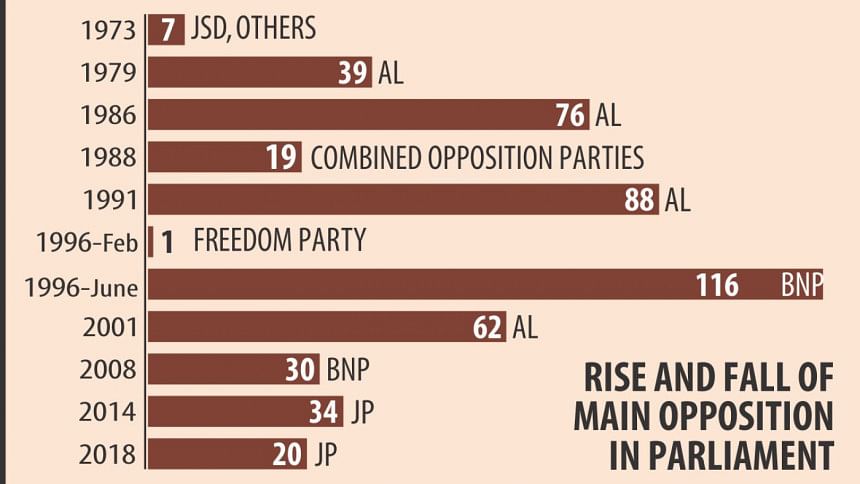
"The speech delivered by Bangabandhu Sheikh Mujibur Rahman is the only directive," wrote Khandaker Abdul Haq in his book "Parliamentary Practice and Procedure" published by the Jatiya Sangsad Secretariat in 2001.
"His directive has been derived from experiences of the Pakistan National Assembly and East Pakistan Provincial Assembly and it is consistent with the parliamentary culture of India and this sub-continent," wrote Haq, who was a senior official at the Parliament Secretariat.
If Bangabandhu's directive is taken into consideration, JP would need five more seats to qualify to become the opposition party in the new parliament. If JP is not the official opposition, none of its MPs could be the leader of the opposition.
The JP became the main opposition in the current parliament formed through the 2014 election, which the BNP-led alliance boycotted. It won 34 seats and its senior leader Raushan Ershad was recognised as the leader of the opposition with a status of a minister. Three JP MPs were also made ministers.
Their dual role has been criticised. The party could not play its due role as the main opposition in parliament in the last five years.
JP Secretary General Mashiur Rahman Ranga yesterday said his party would hold a joint meeting of the party's presidium members and MPs-elect today to decide whether it would join the government or sit on the opposition bench.
"We will also discuss it with the grand alliance," he said at a discussion at the party's Banani office.
The Election Commission will announce next week the election schedule for the 50 reserved seats for women in the 11th parliament, EC Secretary Helal Uddin Ahmed said today.
“According to the 11th parliamentary election results, 43 seats will be reserved for Awami League while four for the Jatiya Party, one for Jatiya Oikyafront and two for the independent and other candidates,” Helal Uddin Ahmed told reporters at Nirbachan Bhaban in the capital’s Agargaon.
Besides, the upazila parishad elections will be held in phases from the first week of March, he added.
The AL-led grand alliance secured 288 seats -- the AL 257, the JP 22 and others 9 -- in the December 30 election. The BNP-led Jatiya Oikyafront got only eight seats.


 For all latest news, follow The Daily Star's Google News channel.
For all latest news, follow The Daily Star's Google News channel. 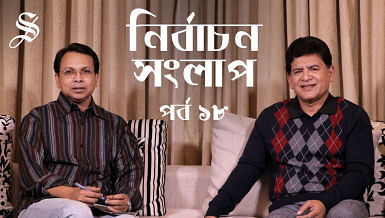
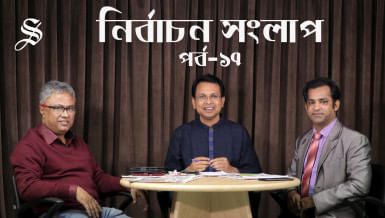
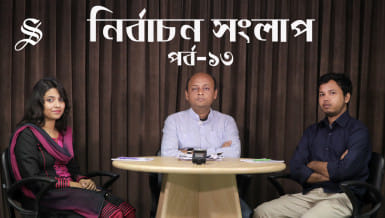
Leave your comments